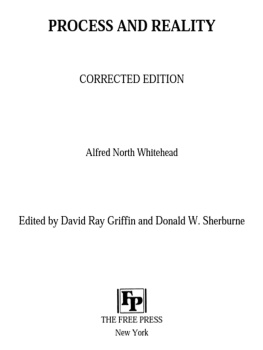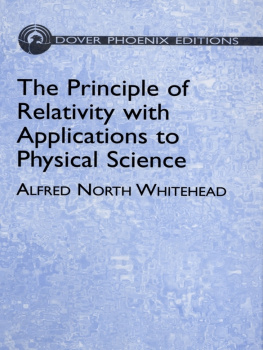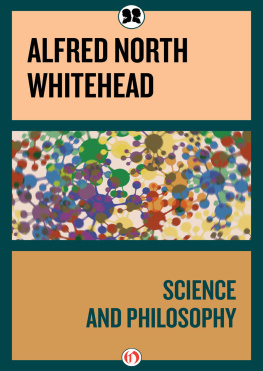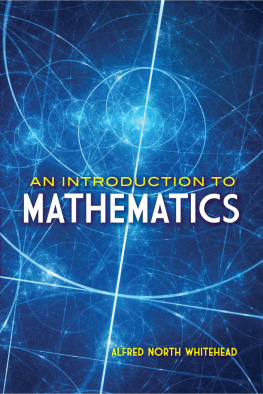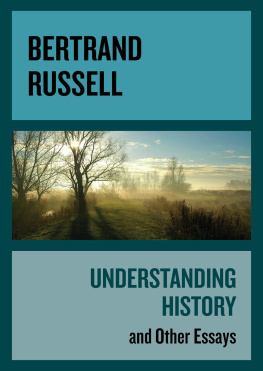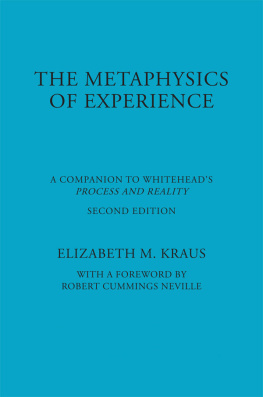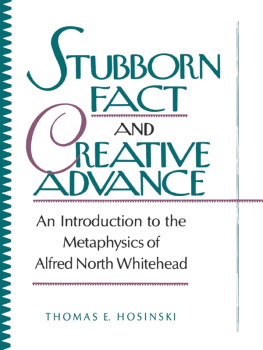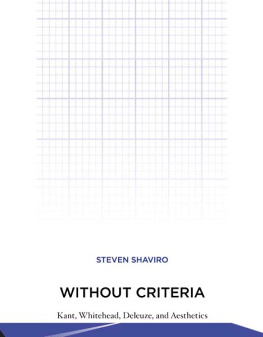PROCESS AND REALITY
CORRECTED EDITION
Alfred North Whitehead
Edited by David Ray Griffin and Donald W. Sherburne

THE FREE PRESS
New York
PROCESS AND REALITY
CORRECTED EDITION
PROCESS AND REALITY
AN ESSAY IN COSMOLOGY
GIFFORD LECTURES DELIVERED IN THE UNIVERSITY
OF EDINBURGH DURING THE SESSION 1927-28
BY
ALFRED NORTH WHITEHEAD
F.R.S., Sc.D. (Cambridge), Hon. D.Sc. (Manchester),
Hon. LL.D. (St. Andrews), Hon. D.Sc. (Wisconsin),
Hon. Sc.D. (Harvard and Yale)
THE FREE PRESS
1230 Avenue of the Americas
New York, NY 10020
www.SimonandSchuster.com
Copyright 1978 by The Free Press
All rights reserved,
including the right of reproduction
in whole or in part in any form.
THE FREE PRESS and colophon are trademarks
of Simon & Schuster Inc.
First Free Press Paperback Edition 1985
Manufactured in the United States of America
Paperbound printing number
10 9
Library of Congress Cataloging-in-Publication Data
Whitehead, Alfred North, 1861-1947.
Process and reality.
(Gifford lectures; 1927-28)
Includes index.
1. CosmologyAddresses, essays, lectures.
2. SciencePhilosophyAddresses, essays, lectures.
3. Organism (Philosophy)Addresses, essays, lectures.
I. Griffin, David
II. Sherburne, Donald W.
III. Title.
IV. Series.
BD511.W5 1978 113 77-90011
ISBN 9781582294087
ISBN 9781439122969 pbk.
eISBN 13: 978-1-4391-1836-8
ISBN 13: 978-0-0293-4570-2
EDITORS' PREFACE
Process and Reality, Whitehead's magnum opus, is one of the major philosophical works of the modern world, and an extensive body of secondary literature has developed around it. Yet surely no significant philosophical book has appeared in the last two centuries in nearly so deplorable a condition as has this one, with its many hundreds of errors and with over three hundred discrepancies between the American (Macmillan) and the English (Cambridge) editions, which appeared in different formats with divergent paginations. The work itself is highly technical and far from easy to understand, and in many passages the errors in those editions were such as to compound the difficulties. The need for a corrected edition has been keenly felt for many decades.
The principles to be used in deciding what sorts of corrections ought to be introduced into a new edition of Process and Reality are not, however, immediately obvious. Settling upon these principles requires that one take into account the attitude toward book production exhibited by Whitehead, the probable history of the production of this volume, and the two original editions of the text as they compare with each other and with other books by Whitehead. We will discuss these various factors to provide background in terms of which the reader can understand the rationale for the editorial decisions we have made.
Whitehead did not spend much of his own time on the routine tasks associated with book production. Professor Raphael Demos was a young colleague of Whitehead on the Harvard faculty at the time, 1925, of the publication of Science and the Modern World. Demos worked over the manuscript editorially, read the proofs, and did the Index for that volume. The final sentence of Whitehead's Preface reads: My most grateful thanks are due to my colleague Mr. Raphael Demos for reading the proofs and for the suggestion of many improvements in expression. After retiring from Harvard in the early 1960's, Demos became for four years a colleague at Vanderbilt University of Professor Sherburne and shared with him his personal observations concerning Whitehead's indifference to the production process.
Bertrand Russell that he had not answered a letter, justified himself by saying that if he answered letters, he would have no time for original work. Russell found this justification complete and unanswerable.
In 1929, when Process and Reality was in production, the same sense of priorities was operative. Whitehead was sixty-eight years old, and he still had major projects maturing in his mind: Adventures of Ideas, Modes of Thought, and numerous articles and lectures were still to come. Original work, fortunately, continued to take precedence in his life over humdrum details and trivia. Unfortunately, however, 1929 found Demos in England (working with Russell). As best we can determine at this time, no one with both a familiarity with Whitehead's thought and an eye for detail undertook to shepherd Process and Reality through the production processDemos, in particular, was never aware that anyone else from the philosophical community had worked on the manuscript or proofs. Whitehead's only personal acknowledgment in the Preface is to the constant encouragement and counsel which I owe to my wife.
An examination of the available evidence, including the discrepancies between the two original editions and the types of errors they contained, has led us to the following reconstruction of the production process and of the origin of some of the types of errors.
First, to some extent in conjunction with the preparation of his Gifford Lectures and to some extent as an expansion and revision of them, Whitehead prepared a hand-written manuscript. Many of the errors in the final product, such as incorrect references, misquoted poetry, other faulty quotations, faulty and inconsistent punctuation, and some of the wrong and missing words, surely originated at this stage and were due to Whitehead's lack of attention to details. In addition, the inconsistencies in formal matters were undoubtedly due in part to the fact that the manuscript was quite lengthy and was written over a period of at least a year and a half.
Second, a typist (possibly at Macmillan) prepared a typed copy for the printer. The errors that crept into the manuscript at this stage seem to include, besides the usual sorts of typographical errors, misreadings of Whitehead's somewhat difficult hand.)
Third, it appears that Macmillan set type first and that Cambridge set its edition a bit later, using either a copy of the typed manuscript or, more likely, a copy of Macmillan's proofsheets. There are a large number of errors which the two editions had in common, a large number in the Macmillan edition which were not in the Cambridge edition, and some few in the latter which were not in the former. Their distribution and their character suggest the following observations: Macmillan provided poor proofreading; the Cambridge editor did a much more rigorous job of catching typographical errors; the Cambridge editor also initiated certain sorts of editorial changes, which primarily involved punctuation, though these were not consistently applied throughout the entire text; finally, the types of errors unique to the Cambridge edition seem not to be due to carelessness, but to deliberate attempts to make the text more intelligibleattempts which fell short of their goal because the Cambridge editor did not understand Whitehead's technical concepts.
There is independent evidence that Whitehead himself saw proofs. Lowe has published a letter from Whitehead to his son, dated August 12, 1929, which reads in part: At last I have got through with my Gifford Lecturesfinal proofs corrected, Index Printed, and the last corrections put in. that Whitehead, after discussions with C. I. Lewis, decided to change the adjectival form of category from categorical to categoreal and made this change throughout the galleys. We strongly suspect that Whitehead's work on the proofs was limited for the most part to very particular, specific corrections of this sort.

